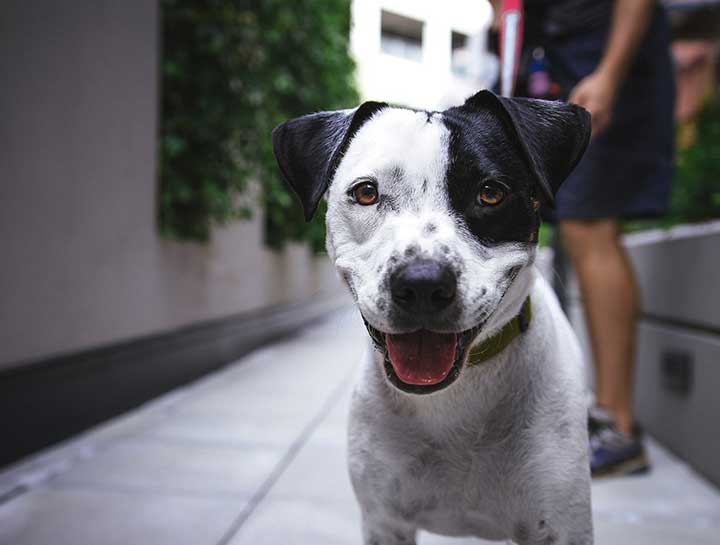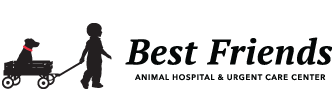Kennel Cough – Facts and Common Misconceptions

It seems like almost daily at the clinic, I see a dog with “kennel cough.” Kennel cough is a term that generates so much confusion because it sounds ONE disease with ONE cause – which is NOT the case. The problem is that upper respiratory infections in dogs are COMMON and can be caused by MANY different pathogens (not just one). Many of these infections have similar symptoms including a harsh, hacking cough which can be dry or produce a foamy, white saliva. Commonly, people think that their dog has “something caught in their throat.”
Part of this is our fault – for years we have commonly referred to the Bordetella vaccination as the “kennel cough” vaccination. But, the truth is the Bordetella vaccine protects a dog from getting an upper respiratory infection from just Bordetella. It does not protect against the other numerous pathogens that can cause the same symptoms.
Here is the current list of pathogens that can cause the symptoms of “kennel cough”:
- Viruses: canine distemper, canine parainfluenza, canine adenovirus ty 2, canine influenza, canine herpesvirus, canine reovirus, canine respiratory coronavirus, and canine pneumovirus.
- Bacteria: Bordetella, Mycoplasma, Streptococcus, and Chlamydophila.
It seems like every year, they add a name or two to the list.
We have vaccines available to protect dogs from some of these pathogens. The DA2PP vaccine or canine “distemper” vaccine protects dogs from three viruses that can cause upper respiratory symptoms: canine distemper, canine adenovirus ty 2, and canine parainfluenza. The Bordetella vaccine is a separate vaccine that protects dogs from getting the infectious bacteria Bordetella. There is also a canine influenza vaccine that protects against one strain of canine influenza.
So why do we see so many dogs with infectious coughs if we have vaccinations? Because if you look at the list, there are at least 7 other pathogens (and probably more in my opinion) that can cause similar upper respiratory symptoms.
Can we test to see which pathogen a dog has? There are two types of tests that can tell us which type of infection a dog has. The first is a respiratory disease PCR profile. The PCR test is accurate at detecting several of the potential pathogens. The test, however, is expensive and does not cover ALL potential pathogens. Additionally, the tests are not always 100% accurate depending on when the patient is sampled during the course of disease. The second type of test is a paired serology test. Although this test is the most accurate, it requires multiple blood samples and is often costly.
Treatment: The good news is that most of the dogs we see with upper respiratory infections have self-limiting disease – they resolve with little or no treatment. There are times that we prescribe cough suppressants and/or antibiotics on a case to case basis. Antibiotics are only beneficial if the patient has one of the bacterial causes of upper respiratory infection.
Most cases of canine upper respiratory infections are highly contagious. It is not uncommon to have “outbreaks” at places that have high dog concentrations such as grooming facilities, shelters, boarding facilities, and day care facilities. Dogs spread the disease by coughing infectious particles and/or direct nose to nose contact. Depending on the pathogen, sometimes they are most contagious right BEFORE they start coughing, which adds to the spread as we don’t even know they are sick at this time. If your dog is showing symptoms, he/she is most likely contagious, so please limit his/her exposure to other healthy animals.
My take home tips are:
1. Vaccinate your dog for DA2PP (distemper, adenovirus, and parainfluenza), Bordetella, and potentially Canine Influenza (if the disease is present in your area). We have had confirmed cases of canine influenza in Montana and we do offer the canine influenza vaccine. Canine influenza activity varies in different regions and seasons.
2. Know your dog will ALWAYS HAVE SOME LEVEL OF RISK of picking up an upper respiratory infection if he/she is in contact with other dogs or housed with other dogs (boarding facilities, grooming facilities) even without direct contact.
3. If your dog does become sick with a cough, have them checked by a veterinarian. We can help discern how sick they are and what treatment (if any) is recommended.
4. Keep your dogs away from other dogs until they are no longer showing any symptoms to help limit the spread of disease.
5. Call your veterinarian if your dog doesn’t recover as expected or if you have additional concerns.
